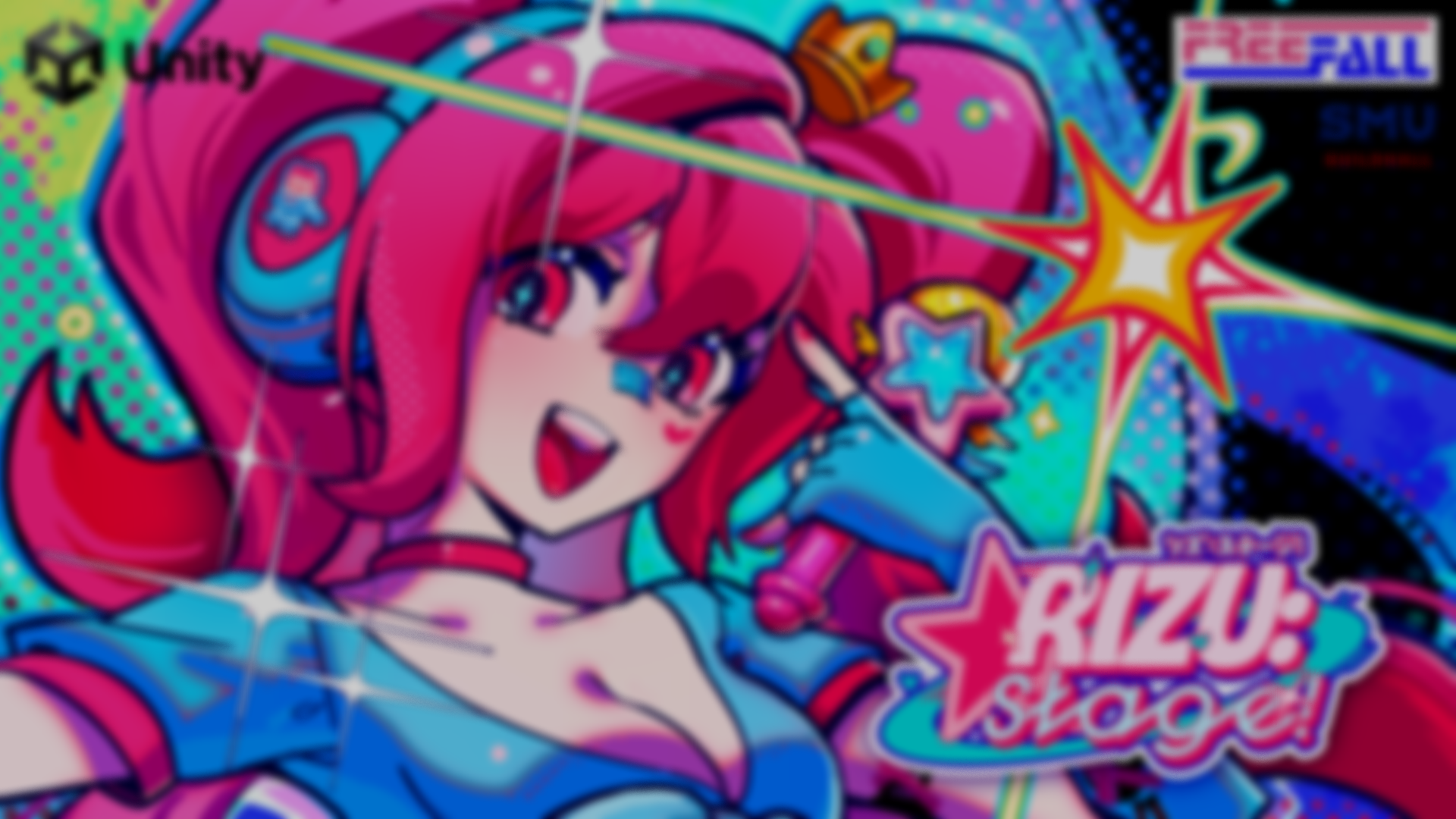
A Unity Music Game
Rizu: Stage! is a 2D rhythm dungeon crawler for Android tablet where you move and attack on the beat. Help intergalactic idol Rizu explore 6 different venues, reclaim her microphone, and get back to the stage to perform. Enjoy the game’s adorable hand-drawn anime art style, bubbly music, and six levels. Kill enemy haters that get in your way, rack up a high multiplier and higher score, and go for the best rank for each level.
Rizu: Stage!
Game Trailer
Design
Tutorial Level – Core Mechanics Introduction
This is the introductory level of the game, designed to teach core gameplay mechanics through natural progression:
Movement Basics: Players are first guided through basic navigation and character control.
Interaction & Combat: They learn how to pick up items, defeat single enemies, and later handle multiple foes.
Mastering Timing: Gameplay gradually introduces timing-based challenges, reinforcing player skill development.
Final Sequence: The level culminates with the microphone pickup mechanic and a return to the stage, setting the tone for the rest of the game.
This level focuses on smooth learning flow, ensuring players are confident and prepared for upcoming challenges.
Level 2 – Mastery & Challenge Expansion
This level builds upon the core mechanics introduced earlier, pushing players toward deeper mastery:
Environmental Hazards: Introduces timing-based traps and platforming challenges that require precision and awareness.
Advanced Combat Encounters: Features enemies with new attack patterns, prompting players to adapt tactics and strategically apply learned skills.
The design emphasizes progressive difficulty and mechanical reinforcement, keeping the experience both challenging and rewarding.
Level 4 – Rhythm, Flow & Advanced Combat
This level puts the player’s skills to the test through fast-paced, dynamic scenarios:
Integrated Mechanics: Challenges players to seamlessly chain movement, combat, and dodging, emphasizing rhythm and flow.
Coordinated Enemy Waves: Introduces group-based enemy encounters, requiring threat prioritization and spatial awareness.
The design encourages players to think quickly and act fluidly, rewarding mastery with an intense and satisfying gameplay experience.
Final Boss – Ultimate Skill Test
The culmination of the game’s mechanics, this level delivers a multi-phase boss battle that pushes the player to their limits:
High-Stakes Arena: Players face the final enemy in an evolving arena with escalating difficulty.
Phase-Based Design: Each phase introduces new attack patterns, environmental hazards, and mechanical twists.
Total Mastery Required: Success demands precise movement, timing, combat proficiency, and dodge reflexes, as the boss adapts dynamically to the player's actions.
This level is designed to be a climactic, unforgettable test of everything the player has learned.
WHAT WENT WELL?
Efficiency Through Focused Collaboration
I learned the value of a team that balances independence with timely collaboration.
By staying focused on individual tasks and only coming together when needed, we maximized productivity and minimized distractions.
Purposeful and Productive Communication
Our discussions were consistently goal-oriented and concise.
I learned how structured dialogue and the ability to self-regulate team focus can dramatically improve decision-making speed and clarity.
Adaptability Under Pressure
I experienced firsthand how important it is to stay flexible in the face of feedback or unforeseen challenges.
Our team’s ability to quickly pivot and implement solutions taught me the importance of agile thinking and solution-driven teamwork, especially under tight deadlines.
WHAT WENT WRONG?
Lack of Stakeholder Communication
In our push for rapid iteration, we failed to consistently update our stakeholders about ongoing changes.
This led to misaligned expectations and missed feedback opportunities, as we often made decisions based solely on internal judgment.
Poor Task Prioritization
We did not make full use of the task board for planning, often choosing tasks based on personal interest.
As a result:
➤ Some tasks were forgotten or left incomplete
➤ We underestimated task durations, leading to rushed or missed deadlines
Loss of Content Between Builds
We neglected to compare each new build with previous versions, which caused accidental removal of valuable content.
Without milestone-to-milestone review, we lost track of what was working and what should be carried forward.
Regular retrospectives would have preserved quality content and prevented regression.
WHAT I LEARNED?
Team Collaboration & Communication
This was my first experience working on a collaborative game project, and I learned how to be a supportive, communicative team member.
I discovered the importance of clear, constructive dialogue and building trust within the team to ensure smooth progress.
Planning & Milestone Management
I realized how early milestone planning directly affects weekly productivity.
Setting realistic goals and conducting regular check-ins helped us stay on track and iterate successfully.
Game Structuring & Iteration Process
I learned how to define a game concept, break it into major objectives, and translate them into actionable tasks.
This structured approach ensured that everyone understood their roles, streamlining development and improving focus.



